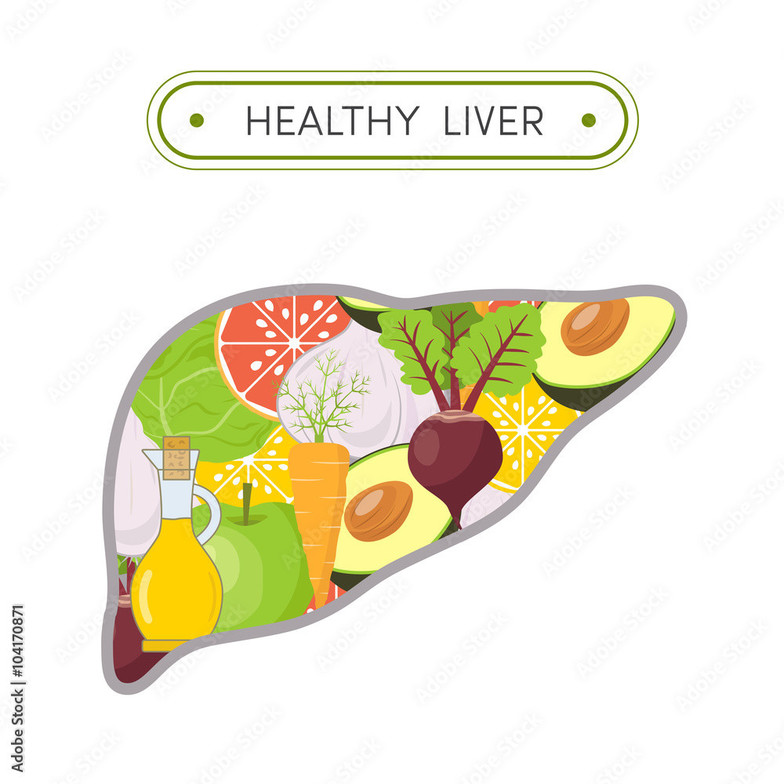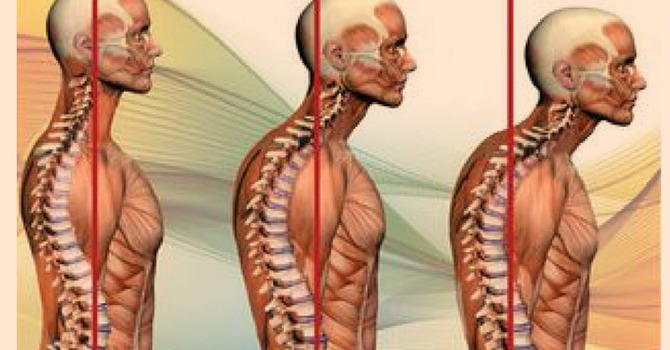
Action Steps to Improve the Health of Your Liver
The liver has many functions but one that is the topic of today's article is the fact that the liver provides support to preventing toxins and harmful chemicals from damaging your body.
The digestive system serves as the first line of defense to protect against bacteria, germs, toxins, and microbes from causing harm to the body.
It is important to understand that the portal vein (the main vein that carries blood from the intestines to the liver) is the connection between your gut and the liver..
When your gut health isn't top notch, toxins have the potential to enter the blood via the portal vein and unnecessarily tax the liver.
The liver is a workhorse. It's your body's primary filtration system—it converts toxins into waste products, cleanses your blood, metabolizes a wide range of compounds (from nutrients and alcohol to medications), and produces proteins and bile. And while a healthy liver naturally cleanses itself, dietary stressors and environmental and toxins can get in the way of optimal liver function.
In a healthy body, the process of detoxification runs smoothly. When the cumulative toxin load is significant, the liver gets overwhelmed contributing to a host of serious illnesses.
Here are some signs your liver if not effectively filtering toxins
- You crave sugar often.
- You feel like you need more energy.
- Your bowel movements aren't as regular as you'd like them to be.
- Pollen isn't your friend during certain times of the year.
- You don't feel as healthy as you expect your nutrient-dense diet should make you feel.
- Your skin isn't clear or feels irritated.
- You're sensitive to chemicals.
- You have concerns about your body odor or bad breath, and hygiene products (e.g., deodorant and mouthwash) aren't cutting it.
- You're feeling stressed or anxious.
- You're resistant to weight change when trying to optimize your body composition.
- You struggle with mood swings.
- You're dealing with gas and bloating.
8 Ways to Cleanse Your Liver Naturally
These strategies are about supporting the liver so it can perform optimally
1. Adopt a liver and gut-friendly diet.
I recommend a balanced, Mediterranean diet, plant-dense diet that promotes healthy body composition and contains diverse nutrients and phytonutrients that support liver and gut health. Increased consumption of plant-based foods improved antioxidant intake and gut microbiota beneficial to liver enzymes.
2: I recommend 8 to 10 glasses of filtered and/or spring water daily. Some experts believe warm water (with or without lemon) is even better because it helps promote good digestion and optimal functioning of the lymphatic system, both of which support liver health and the body's detoxification pathways.
3: Eat Liver-friendly foods
The following foods promote healthy liver functioning by fueling glutathione production, bind heavy metals and toxins, and help stimulate bile flow.
Here are 13 of our favorite liver-friendly foods:
Almonds
Almonds, sunflower seeds, peanuts, wheat germ, salmon, and avocado are all great sources of vitamin E, a potent antioxidant that research suggests can combat oxidative stress and help bolster liver health.
Artichoke
Artichoke contains phenolic derivatives that stimulates bile flow and help protect the liver.
Berries
Berries such as blueberries, blackberries, and raspberries contain phytochemicals called anthocyanins, which have potent antioxidant properties that have been shown to scavenge free radicals and promote normal inflammatory processes.
Beets
They contain phytonutrient pigments called betalains, which promote normal inflammatory responses and support cellular repair in the liver
They also contain betaine, which helps liver cells eliminate toxins, and pectin, a type of fiber that helps bind and clear toxins.
Broccoli sprouts
Cruciferous veggies—such as broccoli sprouts, broccoli, cabbage, cauliflower, Brussels sprouts, and watercress—contain sulfur-containing phytochemicals called glucosinolates, which help the body remove toxins.
Citrus fruits
Lemons, tangerines, and oranges contain a phytonutrient compound called D-limonene.
Dandelion root and greens
Dandelion along with other bitter greens, such as mustard greens and arugula is known for its cleansing properties helping to stimulate bile production and promote healthy digestion.
Fermented foods
Sauerkraut, kimchi, kombucha, other fermented foods are loaded with beneficial probiotic bacteria that promote healthy digestion and the integrity of the gut lining, thereby helping keep toxins out of the bloodstream.
Glutathione-boosting foods
Glutathione is an antioxidant concentrated in the liver that helps bind and neutralize toxins and escort them out of the body via urine or bile. Glutathione can be obtained directly from a few foods—including raw spinach, avocado, and asparagus.
Green tea
The phytochemicals in green tea help trigger both phase one and phase two liver detoxification pathways in the body.
In phase one, toxins are converted into water-soluble compounds by enzymes; and in phase two, toxins are bound to protective chemicals that neutralize them and allow them to be eliminated via bile (and eventually feces) or urine.
Leafy greens
Dark leafy greens such as arugula, spinach, and kale contain plant chlorophylls, which help remove chemicals, pesticides, and heavy metals from the bloodstream. Chlorophyll has been found to have toxin-binding properties, which can reduce the toxic burden on your liver.
Lentils
Get plenty of fiber-rich foods that bind up toxins in the gut and help promote regularity. Try legumes (especially lentils), raspberries, root vegetables, apples, pears, avocados, and almonds.
Salmon
Research has found that omega-3 consumption was associated with healthy liver fat levels
Good sources of these healthy fats include oily fish (e.g., salmon, anchovies, sardines, etc.) for EPA and DHA, and plant-based sources like walnuts and flaxseed for ALA.
4: Try a form of intermittent fasting (IF)
Consider intermittent fasting for additional liver detox support. Research suggests that during periods of fasting, cells in the liver produce more of a protein associated with improved sugar metabolism and reduced levels of liver fat called GADD45β.
One of the benefits of IF is the self-cleaning tools utilized during fasting is something called autophagy, which literally translates to 'self-eating.' When this process is allowed to do its thing, our body's healthy cells gobble up unhealthy cells, leading to a true cellular detox."
A good introduction to intermittent fasting is the 16-hour fast, in which you confine all of your daily eating to an eight-hour window and fast for the remaining 16 hours.
5. Use liver-supporting supplements strategically.
There are individual nutrients that have scientific backing for their ability to support liver health by protecting liver cells, assisting in the filtering and removal of unwanted toxins, stimulating bile production, and more.
Milk thistle
One of the most well-known herbal supplements for liver health is milk thistle (aka: silymarin)
It has antioxidant and inflammatory response balancing properties and has also been shown to boost glutathione levels known as the master antioxidant.
Look for a milk thistle supplement that's standardized to contain a concentrated dose (e.g., 70 to 80%) of silymarin.
Glutathione
Glutathione is a critical regulator of oxidative stress, quenching free radicals wherever it goes—including the liver, where it assists in conjugating toxic compounds into neutral ones so they can be easily eliminated from the body.
Liposomal Glutathione is my preferred recommendations from QuickSilver Scientific or Designs for Health
Turmeric
Turmeric root has demonstrated hepatoprotective (i.e., good for the liver)
The turmeric botanical also helps maintain inflammatory and oxidative balance.
Other research suggests turmeric helps stimulate the production of bile—the fluid produced by our livers that aids in the digestion of fats within the small intestine.
N-acetyl-L-cysteine (NAC)
NAC is a powerful antioxidant that has been shown to promote oxidative balance in the liver.
Vitamin C
Antioxidant activity is important when it comes to promoting liver health and supporting the body's detoxification efforts
To fight oxidative stress in the liver, look for a vitamin C supplement with bioavailable doses of the essential vitamin.
Chlorella
Algae, specifically chlorella, is a powerful chelator, which means it can bind to and help remove heavy metals and other toxins that might otherwise tax your liver.*
Studies show that chlorella can absorb 40% of the heavy metals in a test solution within seven days.
As a unique sea vegetable, chlorella also contains several nutrients and phytonutrients with antioxidant actions—including vitamin C, chlorophyll, beta-carotene, lutein, and lycopene
Activated charcoal
Like chlorella, activated charcoal can help bind to and remove toxins that are circulating in your system. However, it can also bind to minerals and vitamins, so you should take it between meals and away from other supplements.
If you take other supplements in the morning, consider taking one activated charcoal tablet between lunch and dinner.
Selenium
This important antioxidant mineral is vital to the body's natural detoxification pathways for its free-radical-quenching abilities. When it comes to liver function, selenium helps reduce the toxicity of heavy metal ions (e.g., cadmium and mercury) so they can be effectively removed from the body.*
Adults should get at least 55 micrograms of selenium a day through diet and supplementation, but can safely take a more concentrated amount, up to 400 micrograms, to support the body's detox efforts.
6: Exercise daily
Exercise plays a huge role in improving the function of all your organs, including your liver. It will stimulate blood flow to and through the liver, making it better able to flush out garbage and toxins and combat inflammation. Plus, it will aid in weight maintenance, which will lower your risk of non-alcoholic fatty liver disease.
Start with something like walking and build up to 30 minutes of aerobic activity per day.
Strength training can also be helpful.
7: Schedule a daily sweat session.
Sweating helps take some of the detoxification burden off of your liver.
Ridding the body of the toxins is done through three major pathways.
While urine (via the kidneys) and moving your bowels (via the gut) might immediately come to mind as excretion pathways, the less obvious but no less important route of toxin removal is via sweating (the skin).
The skin is our major detoxification organ, and sweating is the best way to get the toxins out of our body.
Include dry brushing and hot towel scrubbing are two more soothing and detoxifying bathroom rituals that promote calm, as well as lymphatic circulation, which helps flush toxins from the body.
I personally own and recommend an infrared sauna. I The recommend the following company: https://www.sunlighten.com
** I do not receive any compensation by recommending the above infrared sauna
8: Manage your stress.
Stress is a known risk factor in a broad range of health problems, including liver disease.
Too much stress in your life can negatively affect all facets of your well-being (including your liver) and increases the presence of free radicals in your body, which can contribute to oxidative stress that accelerates liver degeneration.
To optimize your mental and physical well-being, it's in your best interest to address unchecked stress and adopt healthy habits that promote calm in your life.
Something as simple as an aromatherapy bath once or twice a week can do the trick. Try this detox bath recipe featuring ginger, Epsom salts, baking soda, and a few drops of your favorite essential oil—it will soothe your senses, relieve achy joints, and help you sweat out some toxins.
Quite simply, anything that brings you joy is a form of self-care.
Dr. Grisanti's Comments:
As I presented in this article there are a number of options to improve liver health. First and foremost, it is imperative to minimize anything and everything that stresses the liver. That would include: exposure to toxic foods and chemicals, poor gut health, stress, etc. We can't necessarily control 100% of our exposure to pollutants and chemicals, however you can make strategic diet and lifestyle shifts as presented in this article that counter their effects by supporting the liver's detoxification pathways and lightening our overall toxic load.
As always, although most on what I presented are all generally safe, you should still talk to a health care professional to ensure they don't interfere with your health regimen (e.g., medications).
This article is provided by: Ronald Grisanti D.C., D.A.B.C.O., DACBN, MS, CFMP
References:
https://www.ncbi.nlm.nih.gov/pmc/articles/PMC7939748/
https://www.ncbi.nlm.nih.gov/pmc/articles/PMC4064079/
https://www.ncbi.nlm.nih.gov/pmc/articles/PMC5960814/
https://pubmed.ncbi.nlm.nih.gov/30578029/
https://www.pcrm.org/news/health-nutrition/vegan-diets-improve-liver-function
https://www.ncbi.nlm.nih.gov/pmc/articles/PMC10564080/
https://www.ncbi.nlm.nih.gov/pmc/articles/PMC8290466/
https://www.mdpi.com/2072-6643/15/10/2394
https://www.ncbi.nlm.nih.gov/pmc/articles/PMC9348909/
https://pubmed.ncbi.nlm.nih.gov/29520889/
https://www.ncbi.nlm.nih.gov/pmc/articles/PMC9314000/
https://www.ncbi.nlm.nih.gov/pmc/articles/PMC10469647/
https://www.ncbi.nlm.nih.gov/pmc/articles/PMC9813215/
https://www.frontiersin.org/journals/pharmacology/articles/10.3389/fphar.2023.1256029/full
https://www.ncbi.nlm.nih.gov/pmc/articles/PMC5598502/
https://pubmed.ncbi.nlm.nih.gov/21445622/
https://www.ncbi.nlm.nih.gov/pmc/articles/PMC8063808/
https://www.ncbi.nlm.nih.gov/pmc/articles/PMC7912758/
https://www.ncbi.nlm.nih.gov/pmc/articles/PMC7997318/
https://www.ncbi.nlm.nih.gov/pmc/articles/PMC5549431/
https://www.ncbi.nlm.nih.gov/pmc/articles/PMC4538013/
https://pubmed.ncbi.nlm.nih.gov/37513218/
https://pubmed.ncbi.nlm.nih.gov/30796701/
https://www.ncbi.nlm.nih.gov/pmc/articles/PMC10394692/
https://www.ncbi.nlm.nih.gov/pmc/articles/PMC5019889/
https://www.sciencedirect.com/science/article/pii/S0965229923000390
https://pubmed.ncbi.nlm.nih.gov/22308119/
https://www.ncbi.nlm.nih.gov/pmc/articles/PMC4122038/
https://www.ncbi.nlm.nih.gov/pmc/articles/PMC8912406/
** Always consult with a physician or healthcare practitioner with significant integrative or functional medicine training before starting any of the above recommendations.
You can find a qualified and certified functional medicine practitioner by going to: www.FunctionalMedicineDoctors.com
The information on this website is not intended to replace a one-on-one relationship with a qualified health care professional and is not intended as medical advice. It is intended as a sharing of knowledge and information from the research and experience of Dr. Grisanti and his functional medicine community. Dr. Grisanti encourages you to make your own health care decisions based upon your research and in partnership with a qualified health care professional. Visit www.FunctionalMedicineUniversity.com for more information on our training in functional medicine. Look for practitioners who have successfully completed the Functional Medicine University's Certification Program (CFMP) www.functionalmedicinedoctors.com. This content may be copied in full, with copyright, contact, creation and information intact, without specific permission, when used only in a not-for-profit format. If any other use is desired, permission in writing from Dr. Grisanti is required

Neal Lange
Contact Me



